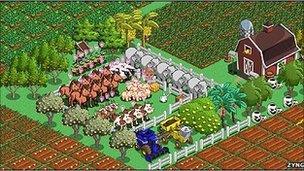Zynga shares fall 5% on stock market debut
- Published

FarmVille is one of Facebook's most popular games
Shares in Zynga, the online games maker behind Mafia Wars and FarmVille, fell 5% on their first day of trading.
The firm had said on Thursday it was to raise $1bn (£640m), having priced its initial public offering (IPO) of 100 million shares at $10 a share.
Shares in the company initially rose as much as 10% on the Nasdaq on Friday before rolling back to close at $9.50.
Its flotation is the largest by an internet company since Google raised $1.9bn at its IPO in 2004.
Zynga's IPO price values the company at about $9bn.
But its performance on its first day of trading stunned investors, who had expected a strong showing because the company is profitable, unlike other recent high profile internet IPOs such as Groupon and Pandora.
"This is a disaster for them. The way you're supposed to price deals is to give investors a 15% IPO discount to compensate them for the risk of backing a relatively new company," said Dan Niles, chief investment officer of AlphaOne Capital Partners.
Founded in 2007, Zynga doubled sales to $829m in the first nine months of 2011.
Unlike its main rivals, it does not charge for the actual games, but makes money by selling add-ons including weapons or extra characters.
Market leader
Zynga's other revenue stream is unique advertising, such as Starbucks paying to have a virtual coffee shop in CityVille.
Users might have to visit that virtual store 10 times in order to build a Starbucks franchise in their own virtual cities.
Stephanie Chang, research analyst at Renaissance Capital, said: "It's currently the leader in the social gaming space. It has 54 million daily active users, which is more than the next 14 game developers combined."
She also pointed to the company's exposure to an estimated 3% of internet users, which gave it advertising potential of $1.5bn.
"That's a source of growth they haven't even tapped into yet," she said.
Facebook exposure
Zynga publishes four of the top five games played on Facebook, and 95% of its revenue is generated from the social network.
Facebook, which is itself expected to go public next year, takes a 30% cut of the revenue Zynga makes on its platform.
Julie Meyer from Ariadne Capital told Radio 5 live about Zynga's success
But while its exposure to Facebook may be enticing to some investors, it could also pose a future risk.
If Facebook's user growth slows, Zynga's growth is also likely to slow.
Investors will want to see that the games maker can diversify and make money from other avenues.
- Published2 December 2011